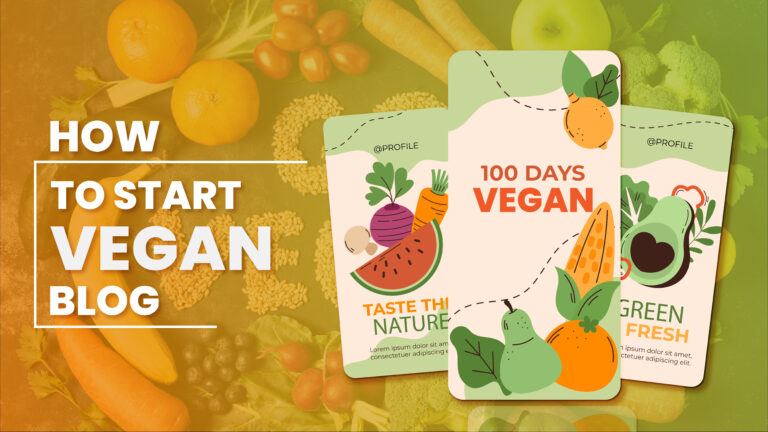In 2026, veganism has matured from a niche trend into a dominant global movement centered on health and sustainability. With the explosion of interest in ethical living, now is the perfect time to learn how to start a vegan blog and reach a conscious audience. This guide explores every step of the process, from choosing a specific niche to building a loyal following in a competitive digital space. You will learn to showcase your best recipes using high-quality visuals and interactive elements that modern readers expect. By mastering the art of sharing innovative plant-based recipes, you can create a captivating platform that inspires others. Whether you focus on budget-friendly meals or gourmet dining, this roadmap will help you launch a site that thrives in the 2026 creator economy.
What is a Vegan Blog?
A vegan blog in 2026 is a dynamic digital platform that transcends simple recipe sharing to become a holistic hub for the plant-based movement. It serves as an essential resource for those seeking healthy vegan recipes, ethical lifestyle advice, and sustainability tips, bridging the gap between culinary creativity and conscious living. More than just a collection of the best recipes, a successful vegan blog offers a human narrative sharing personal transition stories and kitchen triumphs that AI cannot replicate. By curating innovative plant-based recipes and honest product reviews, these blogs empower readers to navigate their diet with confidence. Ultimately, it is a community-driven space that inspires compassion, health, and environmental stewardship in an increasingly automated world.
Essential Steps to Launch Your Vegan Blog
Choosing Your Niche
To stand out in the competitive digital landscape, you must identify a specific sub-niche that highlights your unique expertise. A focused approach allows you to become a trusted authority rather than a generalist. Consider narrowing your focus to areas such as:
- Culinary Specializations: Instead of general cooking, focus on 30-minute weeknight dinners, gluten-free baking, or budget-friendly grocery hauls.
- Targeted Nutrition: Provide specialized insights into athletic performance, prenatal health, or raising children on a balanced plant-based diet.
- Conscious Living: Explore the intersection of ethics and daily life through zero-waste home tips, sustainable travel guides, or reviews of cruelty-free beauty brands.
Selecting a refined niche helps you tailor your message to a specific audience, making your content significantly more relevant and engaging. This specialization not only builds a deeper rapport with your readers but also signals to search engines exactly what your platform represents, helping you rank higher for the topics you know best.
Setting Up Your Blog
Selecting a Blogging Platform
Choosing the proper foundation is critical for long-term growth. In 2026, you need a platform that is not only user-friendly but also optimized for mobile performance and search engine visibility. Popular options include:
- WordPress.org: The gold standard for professional bloggers. It is a versatile, self-hosted platform with extensive customization options and thousands of plugins to scale your business.
- Wix: A highly visual platform offering intuitive drag-and-drop features, making it ideal for beginners who want a site up and running quickly.
- Squarespace: Renowned for its stunning, award-winning templates and ease of use, perfect for those who prioritize a high-end aesthetic.
While each has its merits, WordPress is highly recommended for its unparalleled flexibility and ownership. Unlike closed platforms, WordPress allows you to fully control your data and integrate advanced monetization tools, ensuring your site can grow from a simple passion project into a powerful digital empire.
Choosing a Domain Name
Your domain name is your digital identity, so it should be memorable, easy to spell, and reflective of your specific niche. Aim for a name that is concise and avoids complex hyphens or numbers that might confuse your audience. You can use AI-powered domain name generators to spark inspiration if you feel stuck. Once you have a shortlist, check availability and secure your handle through reputable registrars like GoDaddy or Namecheap.
Selecting a Hosting Provider
A reliable hosting provider is the engine that keeps your site running smoothly, affecting everything from page speed to security. When choosing a host in 2026, prioritize providers that offer one-click installations and high uptime scores. Popular options include:
- Bluehost: Long recommended by WordPress, it provides an intuitive interface and excellent customer support for new bloggers.
- SiteGround: Widely praised for its superior speed performance, advanced security features, and top-tier technical assistance.
- DreamHost: An excellent choice for those seeking affordable entry-level plans without sacrificing reliability, often including a generous money-back guarantee.
Before committing, ensure your hosting provider is fully compatible with your chosen blogging platform and offers an SSL certificate to keep your readers’ data secure.
Designing Your Blog
A professional design is the digital storefront of your brand. In 2026, user experience (UX) is paramount, so select a responsive theme that performs flawlessly on mobile devices. For vegan creators, themes like Foodie Pro, Veggie, and Cookely offer specialized recipe layouts that are both aesthetic and functional. Customize your chosen theme with a cohesive color palette and straightforward typography to establish a recognizable brand identity. Prioritize intuitive navigation so readers can find your recipes and guides with minimal clicks.
Utilizing High-Quality Images
In the visual-heavy world of food blogging, high-quality imagery is non-negotiable. Crisp, vibrant photos of plant-based dishes are what initially hook a reader. You can source professional visuals from free sites like Unsplash or Pexels, but investing in a quality camera or a modern smartphone with a dedicated food-photography lens will help you produce original content that stands out.
Creating Engaging Content
Content is the heartbeat of your platform. To build a loyal following, focus on three core pillars:
- Informative Writing: Provide deep value through well-researched posts.
- Authentic Storytelling: Share your personal transition to veganism, including the hurdles and the wins.
- Conversational Tone: Write with the warmth of a friend to make plant-based living feel accessible and relatable.
Implementing SEO Best Practices
To ensure your blog doesn’t get lost in the digital noise, lean into Search Engine Optimization (SEO). Use tools like SEMrush or Google Keyword Planner to find high-volume search terms. Optimize your meta titles and descriptions to entice clicks, and use a robust internal linking strategy to keep readers on your site longer, which signals authority to search engines.
Engaging with Your Audience
Transform your blog from a one-way street into a community. Enable and respond to comments, use polls to gather feedback on what recipes readers want next, and maintain an active presence on social media. This direct interaction fosters the “village” atmosphere that 2026 audiences crave.
Monetizing Your Blog
As your traffic grows, you can turn your passion into a sustainable income through several proven channels:
- Affiliate Marketing: Earn commissions by recommending your favorite vegan cookbooks, kitchen gadgets, or specialty ingredients.
- Sponsored Posts: Partner with ethical brands that align with your values to create authentic promotional content.
- Digital Products: Create and sell e-books, meal planning printables, or exclusive recipe guides.
- Coaching: Leverage your expertise to offer personalized plant-based nutrition consulting or cooking workshops.
Promoting Your Blog
Visibility is key to growth. Utilize visual platforms like Pinterest and Instagram to showcase your recipes, and use strategic hashtags to reach the global vegan community. Beyond social media, network with fellow bloggers through guest posting and participate in local vegan festivals or online forums to establish your presence in the niche.
Analyzing Your Performance & Staying Updated
Success requires constant refinement. Use Google Analytics to track which posts resonate most with your audience and adjust your content strategy accordingly. Stay ahead of the curve by following industry news and experimenting with new formats, such as short-form video tutorials or podcasts, to keep your brand fresh and relevant.
Essential Tools for Food Creators
Before you publish your first post, it is helpful to gather a few key tools specific to vegan content creation. You do not need a professional studio, but a decent smartphone camera and natural lighting are essential for making your plant-based recipes look appetizing. Beyond photography, having a reliable recipe plugin for your site (to handle servings and nutrition data) and a basic social media scheduler will save you hours of work. These foundational tools ensure that your healthy vegan recipes are not only delicious but also shareable and easy for your readers to follow.
Developing Your Unique Content Strategy
Once your site is live, consistency becomes the heartbeat of your brand. You need a strategic plan that goes beyond posting random dinner photos; a solid strategy involves mixing healthy vegan recipes with educational value, such as “How to stock a plant-based pantry” or “Vegan protein myths debunked.” By planning your content pillars in advance using themes like “Meatless Mondays” or “Budget Fridays,” you ensure you always have fresh, relevant ideas. This structured approach prevents burnout and keeps your audience deeply engaged, giving them a reliable reason to return. Ultimately, a predictable schedule builds trust, turning casual visitors into dedicated home cooks who rely on your guidance.
Conclusion
Starting a vegan blog in 2026 is an exciting opportunity to share your passion for plant-based living with a global audience. By following these steps from selecting your specific niche to designing a professional platform, you can build a successful site that fosters a vibrant community. Your success depends on consistently sharing high-quality plant-based meals and providing healthy vegan recipes that solve your readers’ daily cooking dilemmas.
As you grow, continue to stay authentic and adapt to the evolving digital landscape by perfecting your delicious vegan meal recipes. Your platform has the potential to make a meaningful impact, contributing to a more compassionate world while establishing your own digital authority. The journey requires dedication, but your unique voice is precisely what the plant-based community needs. Start your journey and press publish today.
Read More
How to Start a Real Estate Blog in 2026
10 Biggest Blogging Mistakes Beginners Must Avoid in 2026
How to Start a Counseling Blog in 2026
Frequently Asked Questions (FAQs)
Do I need to be a vegan to start a vegan blog?
While personal experience with veganism is beneficial, you don’t need to be a strict vegan. Genuine interest and understanding of vegan principles are crucial for authentic content.
How can I make my blog stand out in a crowded niche?
Focus on your unique perspective and voice. Consider offering specialized content, such as specific cuisines or budget-friendly meals. Building a personal brand and connecting authentically will help you stand out.
Is it possible to make money from a vegan blog?
Yes, many bloggers monetize their content through affiliate marketing, sponsored posts, and selling products. Building a successful blog takes time, effort, and dedication, but generating income in the vegan niche is possible.
How often should I post new content on my blog?
Aim for consistency. Establish a schedule that works for you, whether it’s weekly or monthly. Focus on quality rather than quantity.
What are some essential tools for managing a vegan blog?
Consider tools like WordPress for blogging, Canva for design, and Google Analytics for performance tracking. Social media scheduling tools like Buffer can also help manage your presence.


No Comments
Lovely site! I am loving it!! Will come back again. I am bookmarking your feeds also.
Your comment is awaiting moderation.